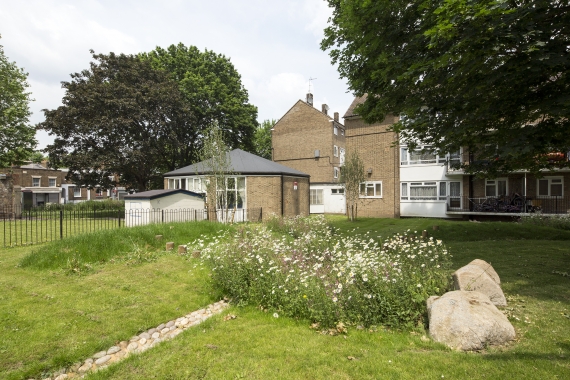Climate-Proofing Social Housing Landscapes
A new Implementation Guide for housing providers
London, 29 September 2016 | Energy
Climate-Proofing Social Housing Landscapes, a project run by Groundwork London in partnership with the London Borough of Hammersmith and Fulham, aims to demonstrate how to prepare and adapt in order to future-proof existing buildings and infrastructure, minimizing the impact extreme weather events will have on both the environment and on people's lives.
Climate scientists predict that climate change is likely to mean more extreme weather events across Europe, including winter flooding and summer heat waves. This will significantly increase the threat of surface water flooding and overheating in urban areas with high soil sealing, drainage systems already at or near capacity, and an increased capacity for heat storage due to the mass of construction material. Flooding can cause substantial damage, disruption and costs to communities, with those living in social housing often the most vulnerable.
At the same time, vulnerable communities are often the least likely to be able to afford measures that could help them tackle this risk. Whilst most new developments are now designed with the flexibility to adapt to future climates, there is a huge gap in terms of existing housing that was not designed to withstand such changes. Therefore, European countries, and the cities in which many of their citizens live, need to prepare and adapt in order to future-proof existing buildings and infrastructure, minimising the impact extreme weather events will have on both the environment and on people's lives.
Climate-Proofing Social Housing Landscapes, a project run by Groundwork London in partnership with the London Borough of Hammersmith and Fulham, aims to demonstrate how this is possible.
Co-financed by the European Commission’s LIFE+ Programme, the project has centred on three social housing estates in this West London borough. Through this, Groundwork London has been working with the local authority, residents and other key stakeholders to design and implement climate change adaptation measures to ensure that these estates are better placed to withstand the effects of a changing climate.
The programme has demonstrated through water-sensitive urban design measures and other climate adaptation actions that urban housing estates can play an important part in adapting our cities to cope better with climate change.
Key activities have included:
Read More- Retrofitting cost-effective, light-engineering solutions in green spaces to help ease environmental impacts such as flooding and heat waves, adopting a model that is replicable in and transferable to cities across Europe.
- Creating training and employment opportunities for apprentices to carry out some of the adaptation work, and for local authority and social housing staff and grounds maintenance contractors to learn how to maintain these measures and replicate them elsewhere.
- Working alongside residents to give them the opportunity to shape the open space improvements on their estates, and to raise their awareness about the implications of climate change for London and Londoners and the actions residents can take themselves to contribute to adaptation.
A central aim of the project has been to support and enable other housing providers to replicate the climate adaptation approaches adopted in the project across their own estates. With that in mind, Groundwork London has developed a practical Implementation Guide which outlines the opportunities available to housing providers across Europe, providing tools, resources and advice based on the activities and outcomes from the project, and using the three project sites as best practice examples. The Guide sets out the main impacts of, and lessons learned from, the project, and offers practical guidance and recommendations as well as signposting to other relevant resources and case studies from across Europe and beyond.
The Guide focuses on implementing climate adaptation measures on housing estates, in particular in the context of retrofitting solutions to existing open spaces. It considers a number of aspects of such projects, from the planning stage through to implementation, maintenance and monitoring, reflecting on key components such as identifying opportunities, engaging stakeholders, managing risks and securing funding. Whilst the project described in the Guide is UK-focused, the Guide demonstrates how the approaches used are highly replicable in, and offer considerable benefits to, urban areas across Europe.
* Do you need additional information? Feel free to contact Hannah Baker, Programme Manager at Groundwork London.
Leave comments